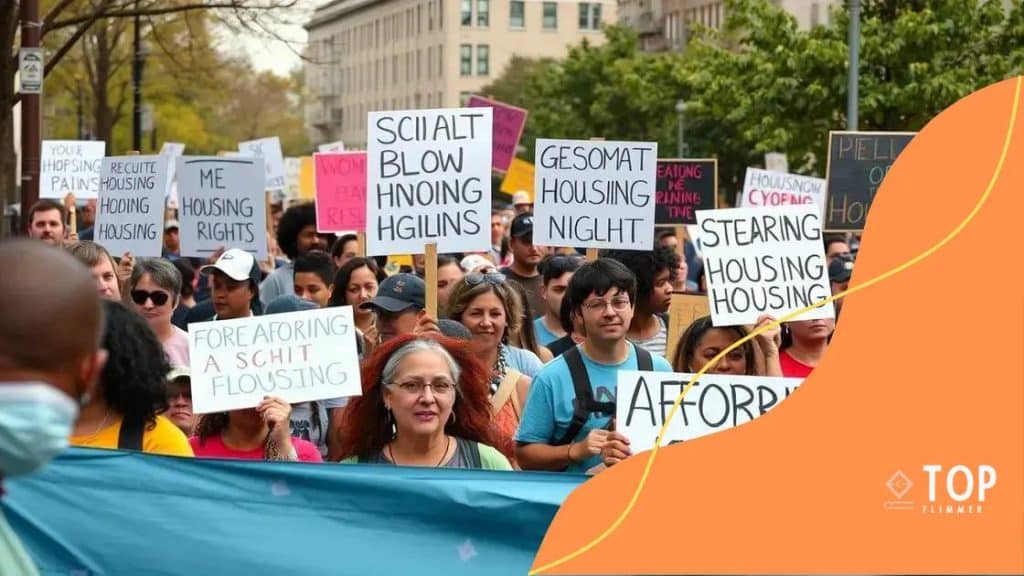Affordable housing activism marches gaining momentum

Affordable housing activism encompasses community efforts to ensure equal access to safe, affordable homes through advocacy, public awareness, and organized marches that influence policy changes.
Affordable housing activism marches are becoming increasingly vital in our fight against rising housing costs and inequality. Have you noticed them popping up in your city? Let’s dive into their significance and what they mean for our communities.
Understanding affordable housing activism
Understanding affordable housing activism involves exploring how communities come together to address the pressing issue of housing affordability. This activism is rooted in the belief that everyone deserves access to safe and affordable homes. It focuses on raising awareness and advocating for policies that support equitable housing solutions.
What is affordable housing activism?
Affordable housing activism seeks to combat the challenges posed by high housing costs, which affect families and individuals across various socioeconomic backgrounds. Activists aim to illuminate the struggles of those who are most impacted by these issues and promote legislative changes to improve their circumstances.
Key aspects of affordable housing activism:
- Community engagement and participation
- Advocacy for policy changes
- Collaboration with local organizations
- Public awareness campaigns
Through community organizing, activists help residents share their experiences and demand changes from policymakers. They often collaborate with local organizations to strengthen their efforts. These partnerships can enhance outreach and create a more robust movement aimed at making housing equitable for all.
Public awareness campaigns are essential in this field, as they highlight the urgency of the issue. Activists use various strategies, including social media, flyers, and town hall meetings, to engage the public. By educating others about the importance of affordable housing, they also build a larger support base.
In summary, understanding affordable housing activism is crucial in addressing the ongoing housing crisis. Through community action, advocacy, and education, these movements strive to create a future where everyone has a place to call home.
History of activism in housing sectors
The history of activism in housing sectors traces back to the early 20th century when housing shortages and poor living conditions spurred public outcry and demands for change. This activism has evolved, reflecting shifts in societal values and economic realities.
Early Movements
In the early days, the labor movement played a significant role in advocating for worker rights, which included the demand for fair housing. As cities grew rapidly during industrialization, the lack of adequate housing became a critical issue. Activists organized rallies and protests to highlight the struggles faced by working-class families.
Key Developments Over Time
- Formation of tenants’ unions
- Introduction of housing policies and regulations
- Establishment of public housing programs
- Formation of advocacy groups focused on housing rights
The formation of tenants’ unions marked a turning point in the fight for better living conditions. These groups empowered renters to stand up against exploitative practices and demand more equitable treatment. Over time, legislation such as the Fair Housing Act helped mitigate discrimination in housing.
In the latter half of the 20th century, housing activism intensified, fueled by civil rights movements that emphasized the importance of equitable access to housing. Advocates successfully pushed for government-supported programs that offered public housing options, helping countless families find stable homes.
Today, the legacy of these movements continues to inspire current activists, who adapt strategies to address the modern challenges of housing affordability and availability. With a growing awareness of social justice, today’s activists strive to ensure that everyone has a place to call home.
Key organizations leading the charge

Various key organizations play essential roles in leading the charge for affordable housing activism. These groups mobilize communities, advocate for policy changes, and raise public awareness about housing issues. Their efforts are vital in the ongoing fight for equitable access to housing.
National Organizations
On a national level, several prominent organizations have significantly influenced housing policy. These include:
- The National Low Income Housing Coalition (NLIHC)
- Habitat for Humanity
- NAHRO (National Association of Housing and Redevelopment Officials)
- The National Housing Trust
The National Low Income Housing Coalition advocates tirelessly for policies that help low-income individuals access affordable housing. Meanwhile, Habitat for Humanity focuses on building homes and providing support to families in need. Each organization approaches the issue from different angles but shares the same goal: helping people secure stable housing.
Local Impact
Local organizations also play a pivotal role in housing activism. These grassroots groups often address specific community needs and challenges. They connect directly with residents to understand their struggles and work collectively to find solutions. Many of these local organizations focus on:
- Organizing community meetings
- Creating resource directories for housing assistance
- Advocating for local legislation
- Providing education on tenant rights
By engaging directly with the communities they serve, local organizations can create tailored interventions that address unique housing challenges. Their grassroots approach fosters strong connections and trust, encouraging more people to get involved in activism.
Overall, the combined efforts of national and local organizations are crucial in the fight for affordable housing. Their dedication continues to inspire change and uplift communities, ensuring that the issue of housing remains a priority.
Impact of marches on policy,
The impact of marches on policy can be significant, often shifting public opinion and influencing lawmakers to take action. Marches serve as a visible demonstration of community concerns, showcasing solidarity among participants and highlighting the urgency of affordable housing issues.
Shaping Public Awareness
One key way marches make an impact is by raising public awareness about housing challenges. Images and stories from these events often spread through media outlets, attracting attention from those who may not be directly affected by housing issues. As more people learn about the realities faced by others, empathy grows, and public support for change increases.
Legislative Changes
When a significant number of people come together to demand change, legislators are more likely to respond. This response can happen in various ways:
- Proposing new housing legislation
- Revising existing policies to increase funding for housing programs
- Initiating inquiries into housing practices
- Building coalitions with community organizations
As marches garner media attention and public support, elected officials feel the pressure to act. They may propose new legislation aimed at increasing affordable housing options, or they may revise existing policies to better address the needs of their constituents.
Furthermore, marches often lead to the formation of coalitions with local organizations. These partnerships can amplify voices and provide resources to advance housing initiatives. When local leaders collaborate, they can develop targeted strategies that address specific community needs.
Ultimately, the continuous efforts of activists, combined with the visibility of marches, create a strong foundation for policy change. Their impact can be long-lasting, leading to significant improvements in housing access and affordability.
How communities can get involved
Getting involved in affordable housing activism is crucial for communities looking to address local housing issues. There are many ways that individuals and groups can step up and make a difference. By becoming engaged, community members can support their neighbors and advocate for necessary changes.
Ways to Participate
Communities can get involved in several impactful ways:
- Joining local advocacy groups
- Participating in community meetings
- Volunteering for housing-related projects
- Educating others about housing rights
By joining local advocacy groups, individuals can connect with like-minded individuals who share the same goals. These groups often provide resources and training to empower community members. Attending community meetings is another effective way to stay informed and voice concerns about housing issues. This direct engagement allows residents to learn about ongoing initiatives and how they can contribute.
Volunteer Opportunities
Volunteering for housing-related projects creates hands-on opportunities to help those in need. Various organizations offer programs, such as:
- Building or repairing homes
- Distributing food and supplies
- Hosting workshops on tenant rights
- Organizing neighborhood clean-up events
These activities not only provide valuable assistance but also foster a sense of community among participants. By working side by side, individuals can strengthen relationships and build a supportive network.
Educating others about housing rights is another vital way to get involved. Sharing knowledge within the community can empower individuals to stand up for themselves and advocate for better living conditions. Workshops, informational flyers, and social media campaigns are effective methods to spread awareness.
In conclusion, community involvement in affordable housing activism can take many forms. By joining forces, sharing knowledge, and volunteering skills, residents can create a powerful impact that leads to real change.
FAQ – Questions about Affordable Housing Activism
What is affordable housing activism?
Affordable housing activism aims to raise awareness and advocate for policies that ensure everyone has access to safe and affordable housing.
How can I get involved in affordable housing activism?
You can get involved by joining local advocacy groups, attending community meetings, volunteering for housing projects, and participating in marches.
Why are marches important for housing activism?
Marches are crucial because they raise public awareness and put pressure on policymakers to make necessary changes for affordable housing.
What kind of organizations lead affordable housing activism?
Key organizations include the National Low Income Housing Coalition, Habitat for Humanity, and numerous local grassroots groups.






